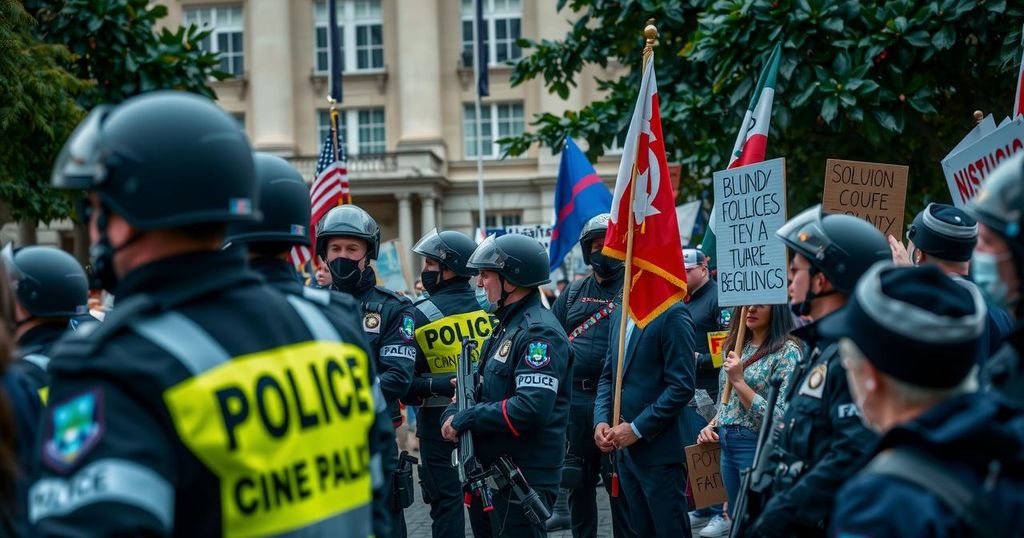Politics
AP, ARGENTINA, BRAZIL, CARACAS, CORRUPTION, CUBA, DEMOCRACY, FOREIGN MINISTRY, HUMAN RIGHTS, JAVIER MILEI, MACHADO, MARÍA CORINA MACHADO, MARIA CORINA MACHADO, NICOLÁS MADURO, NORTH AMERICA, SOUTH AMERICA, U. S, U. S. EMBASSY, VENEZUELA, VENT, VENTE VENEZUELA, VIOLENCE
Fatima Khan
0 Comments
Venezuelan Opponents Allege Harassment Outside Argentine Embassy
Venezuelan opposition members at the Argentine embassy voiced their concerns over police and intelligence presence outside, which the U.S. deemed a breach of international law. Following calls for mobilization by opposition leader María Corina Machado, the embassy reported disturbances including electricity outages, while both the U.S. and Argentina condemned the situation as harassment.
Six Venezuelan political opponents who have sought refuge at the Argentine embassy in Caracas have expressed concern over the presence of local police and intelligence officials stationed outside. This situation has led the United States to classify the actions as a significant breach of international law, with Argentina’s Foreign Ministry labeling the event as harassment. Most of the opposition figures belong to the Vente Venezuela party, led by María Corina Machado, who reported a new siege that began late Saturday and persisted into Sunday. The incident took place shortly after Machado announced plans for a large mobilization set for December 1, triggering accusations from the Venezuelan government of conspiracy against President Nicolás Maduro’s administration.
Vente Venezuela released a statement indicating the embassy experienced electricity outages and was surrounded by regime vehicles obstructing traffic. Argentina’s Foreign Ministry denounced the armed troop deployment and street closures as a safety disturbance and urged the international community to condemn the actions, a call echoed by the U.S. government. The U.S. Embassy in Venezuela stated on social media, expressing strong opposition to the harassment of asylum seekers and demanding Venezuelan authorities respect their international obligations.
Since 2019, diplomatic relations between the U.S. and Venezuela have been suspended. The opposition members originally entered the embassy in March, following the issuance of arrest warrants accusing them of efforts to destabilize the government. The situation has escalated further, especially after Brazil accepted the security of the Argentine embassy amid escalating tensions, which included the Venezuelan government’s accusations against both Brazil and Argentina regarding the use of embassies for nefarious purposes.
The Venezuelan political landscape has been fraught with tension, particularly between the government of President Nicolás Maduro and opposition factions. Since 2019, diplomatic relations with the United States have ceased amid allegations of electoral fraud and governance instability. Prominent opposition leaders, notably from the Vente Venezuela party, have been targeted by the government, facing arrest for allegedly inciting violence against the state. This has led several leaders to seek asylum in foreign embassies, isolated from the political process. The ongoing situation highlights the fraught relationship between Venezuela and its neighboring countries, particularly Argentina and Brazil, which have taken steps to protect their diplomatic missions amid the escalating crisis.
The continued presence of police and intelligence agents outside the Argentine embassy in Caracas exemplifies the severe tensions between the Venezuelan government and its political opponents, drawing international condemnation. The response from the U.S. and Argentina underscores the significance of adhering to international law regarding the protection of asylum seekers. As the conflict escalates, the actions taken by the Venezuelan authorities pose questions about the future of political dissent and diplomatic relations in the region.
Original Source: apnews.com




Post Comment